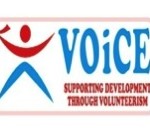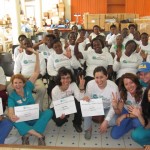
After 10 years of work in 11 regional and national capitals across sub-Saharan Africa, the Millennium Cities Initiative (MCI) is pleased to announce the release of our final report, Improving Lives in Sub-Saharan Cities: A laboratory in global urban development. This publication, which opens with an overview of both MCI’s approach and the particular economic… read more
The Millennium Cities Initiative is pleased to announce the release of The Millennium Cities Initiative: Accra – Networks and Knowledge for Community Resilience-Building in Ghana’s Capital, written and prepared by MCI-Accra Program Manager Joe Melara. In retrospect, Accra was in many ways our most complex Millennium City, if for no other reason than the sheer… read more
We are pleased to share with you our latest MCI report, Education Infrastructure Challenges in East & North Ayawaso Sub-Metros: School Facility Survey Findings and Perspectives From Three School Circuits in Accra, Ghana. This study, researched and written in partnership with the Nima-based youth NGO “Voice in Community Empowerment” (VOiCE), affords us all a snapshot… read more

by MCI|November 20th, 2014
MCI wrapped up its work in Kisumu, Kenya, with a final publication prepared by MCI Public Health Specialist for Kisumu Ms. Beldina Opiyo-Omolo. MCI-Kisumu: A Final Report provides an overview of MCI’s work in Kenya’s third largest city since its initial designation as a Millennium City in 2006. An overview of MCI’s extensive research and interventions in the City, spanning the areas of health, education, gender and urban planning, is followed with a deeper dive into our efforts to strengthen the community of Manyatta, one of Kisumu’s largest informal settlements where residents confirm that programs supporting women and girls, livelihood opportunities and environmental upgrades have made a significant difference in their daily lives.

by MCI|October 29th, 2014
Kindness, hope and belonging: all key attributes of strength embodied in Kisumu’s Girls’ LitClubs. Throughout the school year, LitClubs strive to instill kindness, ignite hope and give all participants a sense of belonging to a group that cares deeply about their overall wellbeing, their future and the stability of their larger community. A multi-school celebration with MCI’s longtime partner LitWorld of the United Nations’ International Day of the Girl Child focused on these three attributes, all core to the LitClub curriculum, in an array of activities organized aimed at encouraging Kisumu residents to “Stand Up for Girls.”

Voice in Community Empowerment (VOiCE), MCI’s former youth nonprofit partner in Accra, VOiCE, released its first newsletter promoting the organization in 2014.

The “Regional Partnership to Promote Trade and Investment in Sub-Saharan Africa: Final Narrative Report,” summarizes the results of a three-year effort sponsored by the Government of Finland and designed and facilitated by MCI to enhance the capacity of three Millennium Cities – Kumasi, Ghana; Mekelle, Ethiopia; Tabora, Tanzania – to stimulate and expand opportunities for private sector investment and trade. The Regional Partnership built on MCI’s earlier efforts to spur economic development in Kumasi and Mekelle and created a comprehensive new program as well for Tabora.

MCI released a report depicting the establishment and early successes of a dynamic new clinic in Kumasi, the Bantama Market Clinic, which MCI established in September 2013 with support from the Kumasi Metropolitan Assembly (KMA) and Health Directorate (KMED). The clinic was the result of a series of consultations with women traders in Bantama, the second largest market in Kumasi, undertaken to better understand their needs so as to help prioritize KMA programming aimed at addressing the gender gaps identified by MCI’s needs assessments. MCI also conducted a baseline survey of the traders, which revealed significant financial instability and limited access to quality healthcare.

The “School2School Connectivity Project: Final Report” summarizes the results of a three-year, public-private partnership between MCI, Columbia Teachers College, the Kumasi Metropolitan Assembly (KMA), the Kumasi Metropolitan Education Directorate (KMED), global communications giants Ericsson and Airtel-Ghana and selected New York City public and private schools. The School2School Connectivity Project was designed to assist junior high school teachers in Kumasi, Ghana, in the uses of the computer and Internet in teaching both the STEM (Science, Technology, Engineering and Math) subjects and the Millennium Development Goals (MDGs), and to connect those teachers with their peers in New York City schools.

In April 2014, Dr. Patricia Gordon and Dr. Joel Cornfield, together with other members of the Cure Cervical Cancer team, returned to Kenya, this time to establish four new clinics in Kisumu and one in Nairobi, with the help of MCI and the International Medical Corps (IMC). The CCC team trained 14 local healthcare professionals in a procedure known as “visual inspection with acetic acid” (“the vinegar test”) and cryotherapy, to treat any pre-malignant surgical lesions. In addition to practical training, the team equipped clinics with hundreds of much-needed supplies used in their routine cervical cancer screenings and treatments.










